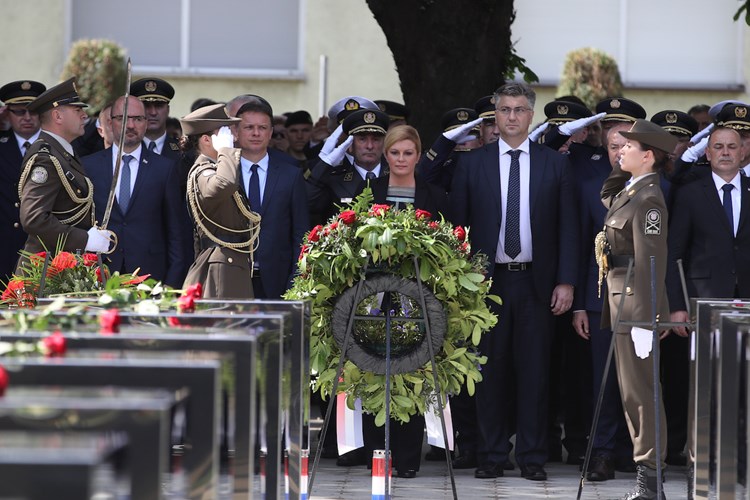


The ceremony started with the unveiling of a memorial site called "The Crystal Cube of Serenity", comprising 51 cubes.
The combined military and police offensive, known as Operation Flash, which ended nearly four years of Serb occupation of the Western Slavonia region, was launched on May 1 and ended on May 3, 1995. During less than 31 hours Croatian troops and police regained control of 500 square kilometres of land, including the main west-east motorway and the railway line leading to Eastern Slavonia.
About 7,200 troops and police officers took part in the liberation of Western Slavonia, of whom 42 were killed and 162 wounded. It was the first time during the 1991-1995 Homeland War that the Croatian Air Force had used airstrikes on a larger scale, and the enemy was further surprised by tanks that were brought in by rail and deployed in combat.
Okucani is located about 130 kilometres southeast of Zagreb. During the war it was the centre of the Serb rebellion and a staging area for terrorist attacks in Western Slavonia.ž
Croatian Prime Minister Andrej Plenkovic said in Okucani on Tuesday, at a ceremony marking the 23rd anniversary of Operation Flash, that Croatia and Serbia "at this moment are two worlds," declining to say whether he and President Kolinda Grabar-Kitarovic would discuss new diplomatic measures against Serbia as a response to Serbia's decision to declare Croatian Defence Minister Damir Krsticevic persona non grata.
Asked to comment on statements by Serbian Foreign Minister Ivica Dacic that Croatia, if it wanted, would get a diplomatic war, Plenkovic said this was not appropriate rhetoric that Croatia should agreed to, underscoring that at this moment, Croatia and Serbia were two different worlds, thus drawing a parallel to Serbian Defence Minister Aleksandar Vulic that he and Krsticevic were two different world.
Plenkovic stressed that it could have never happened in Croatia that a member of the national parliament desecrates the Serbian flag, adding that "in this story Croatia and Serbia are not the same." They were not the same in the 1990, now or in the future, Plenkovic said. Everybody needs to be aware of that, including the media and the public in Croatia, the PM said. "Take a look at my government's rhetoric, since the election. When did we ever use the relations with Serbia as some sort of an argument for international bickering. I don't think that anyone could have thought of that," Plenkovic said.
He confirmed he would talk to President Grabar-Kitarovic this week, but declined to say if the topic of their talks would be taking new measures as a response to Serbia's decision to declare Minister Krsticevic Persona non grata.
Asked if Croatian Foreign Minister Marija Pejcinovic Buric would attend a debate in Brussels on Thursday on the complaint Slovenia had filed with the European Commission claiming that Croatia was in violation of European law given that it has refused to implement the arbitration ruling on the two countries' border dispute, Plenkovic said he was "not sure if the Slovenian foreign minister would be there either."
This kind of a debate is never held at a ministerial level, Plenkovic said. "We will be represented by our state secretary in the foreign ministry Andreja Matelko Zgombic and several experts and professors who will clearly elaborate Croatia's position -- namely that there had been no violation of European law on Croatia' s behalf."
"On the contrary, we are sending a message to Slovenia - we want to resolve this bilateral issue. In good faith we wanted to do that in arbitration process, unfortunately, everyone knows why this process is irreversibly compromised. Croatia has offered Slovenia a solution. We will try to resolve this problem once the election in Slovenia, scheduled for June, end and once their new government is formed. This is not something that should burden Croatia-Slovenia relation. Quite the opposite," Plenkovic said.
Prime Minister Andrej Plenkovic in Okucani on Tuesday commented on the fourth industrial production decline in the past five months, saying the causes of the decline would be analysed but also underlining as important that these indicators do not affect the revenues side of the state budget.
Text: Hina